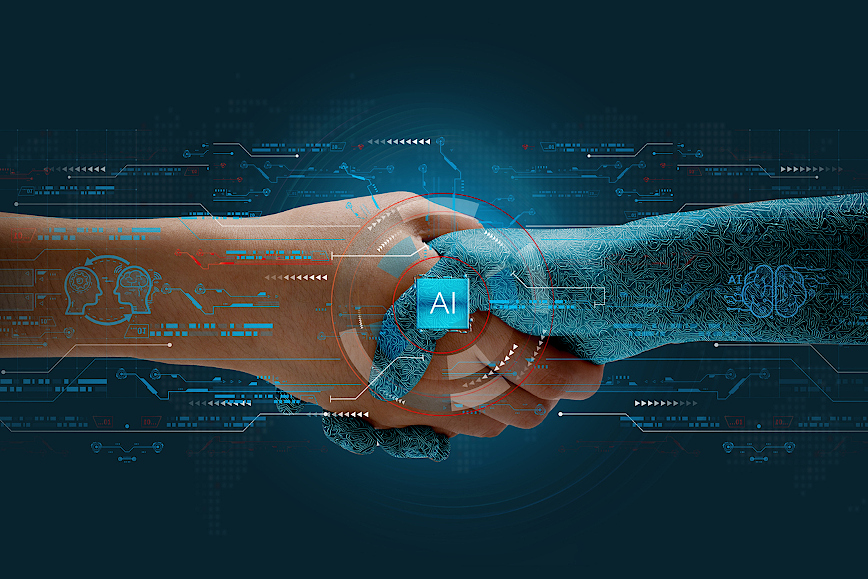AI in the Workplace: 16 Ways to Stay Ahead in 2025 & Beyond!
As we stand on the brink of 2024 2025, AI has already established itself as an essential collaborator in the workplace. The relationship between humans and AI is growing, moving beyond just automating repetitive tasks or crunching data. We’re seeing AI step into roles that need creativity and decision-making.
It’s like having an extra team member that brings fresh ideas to the table, based on data and trends. Think about AI helping with brainstorming sessions, pulling insights from historical data, and spotting emerging patterns.
AI in the Workplace: 1 year later
Almost a year has passed since originally publishing this article. During which time, AI has made many of us better at what we do! Enhancing our expertise instead of replacing it. This shift is happening across the board, from marketing to engineering.
Navigating emerging human-AI partnerships will be a crucial skill in 2025!
It’s no longer about just understanding AI—it’s about mastering how to work with it. The people who can integrate AI into their processes, fine-tune its output, and really harness its potential will be the ones who get the most benefits out of it. Bottom line: mastering this collaboration will set you apart from the competition.
Looking Ahead: AI Ethics and Governance
In 2025, we’re going to see more and more focus on AI ethics and governance. Also read, AI Regulation: AI to Regulate Itself!
With AI becoming deeply embedded in business and even governments, the need for clear rules and regulations will ramp up. We’re talking about important issues like data privacy, bias in algorithms, and who’s accountable when AI makes mistakes. Companies can’t just use AI—they have to ensure they’re doing so responsibly.
As AI takes on bigger tasks, especially in critical fields like healthcare or law, its impact on human lives will be massive! With that responsibility comes the need for businesses to create internal structures to keep an eye on how AI is being used, making sure customers and employees are protected from any unintended consequences. Those who take the lead in this space gain a serious advantage moving forward.
Until then, here’s the rest of the original article, in which we examine the role of AI in the workplace, preparing ourselves to adapt to the transformative ways AI is reshaping all industries:
Understanding AI’s Current Landscape

It’s important to understand the complementary role of AI.
Today’s AI landscape is a rich tapestry of technologies that are transforming industries, from healthcare and finance to education and entertainment.
Generative AI, machine learning algorithms, and neural networks are at the forefront, powering advancements like predictive analytics, personalized customer experiences, and automated decision-making.
The landscape of AI in 2024 and beyond is simple:
If you are not integrating AI into your workflow, projects, and execution of ideas—your competition will!
For instance, in healthcare, AI-driven diagnostic tools are helping doctors detect diseases earlier and with greater accuracy. In finance, AI is used for real-time fraud detection and personalized investment strategies.
Meanwhile, in the realm of customer service, AI chatbots are increasingly being used to provide 24/7 assistance, learning from each interaction to deliver increasingly sophisticated and personalized support.
AI’s evolution is marked by generative AI’s widespread adoption, particularly in chatbots and other interactive tools. These technologies have transitioned from simple scripted responses to complex, context-aware interactions, demonstrating an understanding and generation of the human language at unprecedented levels.
The widespread adoption of these technologies is not just streamlining operations but is also opening up new avenues for growth and innovation, pushing businesses to rethink how they operate and strategize for the future.
Generative AI, especially in the workplace, has become a catalyst for increased productivity and innovation. As routine tasks become automated and complex problems are solved more efficiently by AI, an increasing number of individuals and organizations are realizing the immense potential of integrating AI into their workflows.
The key is not just to adapt to AI, but to excel alongside it, leveraging its capabilities to enhance human expertise and creativity. This begins with our mindset, work ethics, adaptability and openness to change.
AI Amplifies Productivity – It’s NOT About Working Less!
There are some common misconceptions about AI chatbots and generative AI. Some believe AI aims to replace our job responsibilities, while others see its primary benefit as reducing daily workloads. As the saying goes, ‘work smarter, not harder.’
While this principle once held more truth, it’s crucial to remember that with AI, our coworkers and competitors also have access to the same tools!
As such, I think it’s crucial to recognize that integrating AI into your workday and projects, isn’t about seeking shortcuts to work less for the same output. Rather, it’s more about leveraging technology to amplify your efforts and deliver significantly more.
In this context, AI becomes a tool for those who are dedicated, motivated, and eager to push the boundaries of what’s achievable through hard work and innovation. Career success with AI lies in combining its capabilities with yours to ensure that, instead of replacing effort, it becomes a catalyst for achieving remarkable results!
With that in mind and specifically regarding our careers and in the workplace, let’s look at the 16 ways to stay ahead of AI for years to come.
16 Ways to Stay Ahead of AI in the Workplace

No matter your profession, integrating AI can lead to significant benefits.
As AI is constantly evolving, staying ahead means embracing continuous learning and adaptability. For the average worker, this doesn’t mean becoming an AI expert, but rather understanding how AI changes your industry and how you can continuously adapt your skills accordingly.
No matter what your profession is, understanding and integrating Artificial Intelligence (AI) into your work can lead to significant benefits. Think about how AI can make your job easier or more efficient.
Are there tasks that can be automated? Data that can be analyzed for better decision-making? You know what, as I’m already touching on it, let’s list and discuss practical ways to say ahead, by using AI in your work and professional life:
1) Be Open to Change! – AI is dynamic! Be open to changing your approach as new AI technologies and methodologies emerge. Embracing this flexibility will keep you agile and able to leverage the latest innovations to your advantage.
— Read this book: Build for Tomorrow
2) Embrace a Growth Mindset – Cultivate a mindset that views challenges as opportunities to learn and grow. A growth mindset will help you adapt to new tools and processes more quickly and effectively than your competitors.
— Head over to mindsetworks.com and take this test.
3) Identify Learning Opportunities – Keep an eye out for AI trends and learning opportunities relevant to your field. This might be online courses, webinars, workshops, podcasts and articles that explain AI advancements in easy to follow terms. This further enriches your understanding and application of AI in your professional life.
— Check out CES 2024 and other conferences and conventions.
(If you are attending CES 2024, which features many, many AI sessions, send me a note. Maybe we can connect!)
4) Identify Tasks for Automation – Begin by identifying the repetitive tasks that consume a significant portion of your day. Whether it’s sorting emails, scheduling appointments, or managing inventory, AI can automate these tasks, or at best provide you with advice on efficiently managing these tasks, as a result freeing up time for you to focus on more complex and creative work.
— Head over to Smartsheet.com on task-automation.
5) Explore AI in Your Field – Search the web to find out how AI is being used in your industry. Try to understand the specific applications, tools, and innovations of AI relevant to your field. Use these findings to help enhance your planning. This encourages you to think and make use of AI more creatively.
— Signup for a course at Explore.ai.
6) Understand the AI Tools Available – Research and understand the AI tools that are relevant to your industry. There are AI applications for virtually every field. Find the ones that align with your needs and start using them. This leads into the next strategy.
— Check out: insidr.ai, Findmyaitool.com, toolify.ai and others.
7) Start Small, Apply AI Incrementally – Start applying AI to small aspects (replying to emails, generating ideas, etc.) of your job and gradually expand (writing code, making career decisions, etc.) as you gain confidence and expertise. This methodical approach reduces overwhelm and ensures you’re building a solid foundation of understanding and skills at your own pace.
As you witness the positive impacts and refine your skills, you’ll be better positioned to leverage AI for more complex and significant tasks, driving efficiency and innovation in your work.
— More about this incremental approach at the IU International University of Applied Sciences.
8) Experiment with AI Tools – Many AI tools offer free trials or versions. Experiment with them to understand their capabilities and limitations, but also to discover which tools best suit your needs and preferences.
This allows you to make informed decisions about which AI solutions to integrate into your workflow and how they can be tailored to enhance your productivity and creativity.
— Read Harvard University’s ‘AI Use Cases.’
9) Enhance Your Skills with AI – Consider how AI can enhance your current skills. For example, if you work in a creative field, AI tools can offer design suggestions and automate routine parts of the creative process.
— As a Linux Systems Analyst, AI helps me analyze large datasets to uncover additional insights. I’ve been using AI for error log files, database query optimization and much more.
10) Leverage AI for Decision-Making – By relying on AI for help with decisions, you can uncover hidden opportunities, and strategize with a higher degree of precision and foresight.
Whether it’s determining customer needs, optimizing operations, or planning your next career move, leveraging AI can lead to more informed and effective decisions.
— Have a look at rationale.jina.ai.
11) Set Regular Learning Goals – Define what you want to achieve with your AI knowledge and set regular learning goals to stay on track. This strategic planning helps you measure progress and adjust your learning path for continuous improvement and success.
— Use AI-assisted tools for making and tracking your goals. Like notion.so.
12) Adapt in your use of AI tools – Avoid getting too attached to a particular Chatbot or AI tool because they are continuously advancing with new AI platforms constantly being released. Stay open-minded; the generative AI platform you rely on most today, may fall behind in the coming months.
— ChatGPT, Bard, Claude, Perplexity, Character, Quillbot, Midjourney, HuggingFace, Novelai, Capcut and many more!
13) Implement AI Ethically and Wisely – As you integrate AI into your work, be mindful of ethical considerations, including data privacy and bias in AI algorithms. Ensure that you’re using AI in a way that’s ethical, responsible, legal, and aligned with the best interests of your clients or customers.
— Related reading: AI Regulation: AI to Regulate Itself! | Ethics of Artificial Intelligence.
14) Collaborate and stay updated on AI – Sharing knowledge and strategies can lead to more effective and innovative uses of AI. Join forums or community groups where you can discuss AI with peers from your industry and learn from their experiences. This often provides a support network for troubleshooting, sharing best practices, ideas, and discovering new opportunities to apply AI in your work.
Subscribe to newsletters, stay up-to-date with the latest AI news and developments. This continuous learning approach ensures you’re always aware of the newest trends, breakthroughs, and discussions in the AI field.
— Join our Linux Community (exclusive invitation), subscribe to our newsletter.
15) Plan for AI in the Future – Keep an eye on how AI is expected to change your industry in the long term, and start preparing now. This might mean learning new skills, adapting your role, or even helping to shape how your workplace adopts AI.
Take a look at 50 Mind-blowing ways AI will Reshape Our World in 2024.
16) Set Correct Expectations for AI – This means recognizing that, contrary to popular belief, hard work and creativity are now more important than ever before in AI-driven workplaces. As AI automates routine tasks, the value of human ingenuity and effort increases, shifting the focus to more strategic, innovative, and complex problem-solving activities.
Setting the right expectations involves understanding the complementary role of AI and positioning oneself to leverage these tools while enhancing personal skills that AI can’t replicate. This mindset ensures continued relevance and success in an ever-evolving workplace.
Watch this video: Artificial Intelligence | 60 Minutes Full Episodes.
Conclusion

Your ability to grow with AI is just as important as the technology itself.
At first, I was a bit reluctant to publish this article because I am traveling next week to attend CES 2024. Additionally, I’m currently following the very suggestions I’ve outlined above. Some of these have led to recent changes you may have already noticed in this blog, as well as additions, changes, and announcements coming soon to the ‘Hayden James’ brand and previous domain in 2024.
When I started writing this article, the title began with “10 Ways…”. But, just by openly sharing, researching, and writing this article, it has enabled me to identify even more important strategies we can all make use of. Suggestions, feedback or links to more AI tools are welcome.
In conclusion, AI offers a vast potential to enhance efficiency, creativity, and job satisfaction, and it’s up to each individual to harness this potential and pave the way for a more innovative and productive future.
Recap: research your industry, identify repetitive tasks, seek out AI tools, start small, adapt & collaborate!
By prioritizing continuous learning and adaptability, you’ll keep pace with AI developments and leverage them to enhance your career. As we move into an AI-enhanced future, remember that your ability to grow with AI is just as important as the technology itself! Stay curious, stay informed, and stay ahead!
This article has been updated.
I absolutely agree with what hydn has said here. I use ChatGPT 4o with the Widenex Rust GPT - it’s brilliant. MS Copilot and Claude are also very capable.
The Rust language’s compiler is well-known for keeping you on track in terms of writing safe code. With the Rust GPT quickly sussing out the errors the compiler finds, I’m able to quickly get working programs.
While the ethics of using AI can be questioned when used for writing and creating images, etc., it’s simply not an issue with open-source software, which by design is meant to be fully exchanged, shared and modified for everyone’s benefit. I love AI - as hydn said in this article, it’s like having another team member!